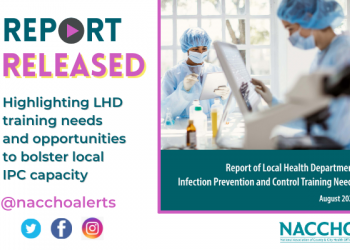The onset of COVID-19 highlighted gaps in knowledge of infection prevention and control (IPC) best practices and principles. The Centers for Disease Control and Prevention’s (CDC’s) Project Firstline is a collaborative comprised of diverse healthcare and public health partners that aims to provide engaging, innovative, and effective IPC training to the more than 6 million frontline healthcare personnel in the United States, as well as members of the public health workforce. Project Firstline aims to provide every person working in a U.S. healthcare facility with a foundational understanding of IPC and the confidence to use it every day to protect the nation from infectious disease threats, such as COVID-19.
Local health departments (LHDs) take on many activities to support IPC in their communities’ healthcare facilities. They build and maintain partnerships with facilities, conduct provider education, support implementation of IPC practices, and conduct infection control assessments and provide follow-up recommendations.
Recognizing the critical role of public health, CDC has also engaged state and local health departments in Project Firstline through the Epidemiology and Laboratory Capacity (ELC) mechanism, including Chicago, Houston, Los Angeles, New York City, Philadelphia, and the District of Columbia. Through this funding, these cities can conduct a variety of activities to meet the needs of healthcare facilities in their communities and can provide valuable examples for other local health departments interested in doing similar work.
The CDC established the Epidemiology and Laboratory Capacity for Prevention and Control of Emerging Infectious Diseases (ELC) Cooperative Agreement in 1995. ELC funding aims to assist health departments across the country to strengthen their surveillance and response capabilities, prevention measures, and overall coordination with HAI response across local health department networks.
NACCHO had the opportunity to connect with staff in Los Angeles (LA) County, California, and Philadelphia who are leading their city’s Project Firstline efforts to find out more about what they have learned about the IPC training needs of their healthcare community and how they have addressed these needs.
Los Angeles County
To maximize limited staff time and funding, many health departments conducted learning needs assessments among healthcare facilities to target future training. LA County conducted a learning needs assessment that was focused on small community care facilities, which they identified had lower access to information and training and greater barriers to implementing infection prevention and control. Through listening sessions and survey collection, mainly with Facility Administrators and Caregivers, LA County found a significant need for additional training on COVID-19, source control, environmental cleaning, and personal protective equipment (PPE).

Training preferences were also assessed, and self-paced learning and hands-on skill practice were favored.
From this assessment, LA County was able to learn not only the topics of most interest to facilities, but also their preferred training delivery methods. They identified a few practices that would guide their future training efforts including ensuring live trainings include times that work for facility staff, conducting Q&A sessions with subject matter experts, and limiting trainings to an hour. To address these needs, Los Angeles County offers live, online training sessions on COVID-19, PPE, transmission and virus strains, disinfection basics and respirator basics. LA County has provided over 90 trainings to date and reached 490 unique staff. Recently, LA County added new trainings using PFL materials and now offers 10 training topics. Information on these training events is available on the LA County Department of Public Health website.
Interested in conducting a learning needs assessment among facilities in your community? Check with your state to see if they have a template they have developed through their work with Project Firstline.
Philadelphia
Philadelphia Department of Public Health (PDPH) conducted a learning needs assessment among healthcare staff to identify gaps in IPC knowledge. Through this assessment, PDPH found that healthcare workers in their community wanted more training in several areas, including multi-drug resistant organisms (MDROs), antimicrobial stewardship, and transmission-based precautions. They also desired a variety of training methods including onsite education, self-paced learning, and online content.
In response to these needs, PDPH developed an “IPC Highlights” newsletter focused on MDROs. Each issue provides highlights of transmission, diagnosis and treatment, resistance profiles, reporting, and IPC recommendations for a specific resistant pathogen, such as Clostridioides difficile (C. difficile), Candida auris (C. auris), Azole-resistant Aspergillus, Carbapenem-resistant Enterobacterales (CRE), carbapenem-resistant and carbapenemase-producing Pseudomonas, and carbapenem-resistant Acinetobacter baumannii.
In addition to this newsletter, PDPH launched short-form, interactive onsite education in long-term care facilities focused on hand hygiene, PPE, and environmental cleaning and disinfection. To date, these trainings have reached 148 staff in four facilities.
PDPH has also used Project Firstline materials to address IPC learning gaps, leveraging the facilitator guide to host trainings, providing facilities with helpful videos, promoting graphics on social media, and sharing new materials on recognizing risk in everyday healthcare environments.
To respond to specific needs of their healthcare community, PDPH has also developed numerous resources for healthcare facilities more broadly, including a Long-Term Care Facility COVID-19 Toolkit, an Outpatient Antibiotic Stewardship Toolkit and a Candida auris toolkit. Additionally, PDPH used the ELC Project Firstline funding to launch an N95 respirator fit test train-the-trainer program and has thus far trained 71 fit testers in 18 facilities, who are now able to conduct the required annual fit testing of their healthcare personnel.
Conclusion
The COVID-19 pandemic allowed some health departments to build on existing relationships with healthcare facilities, evolving from responding after an event to coordinating proactively on IPC. Providing IPC information, materials, and training can help to establish the local health department as a resource and collaborator and Project Firstline has a suite of resources that can help!


